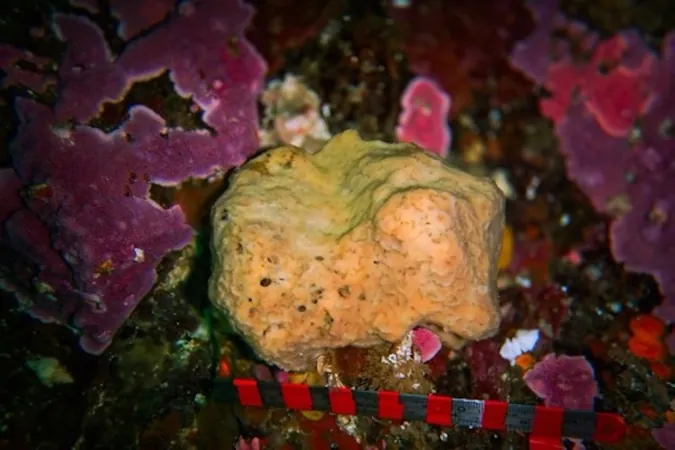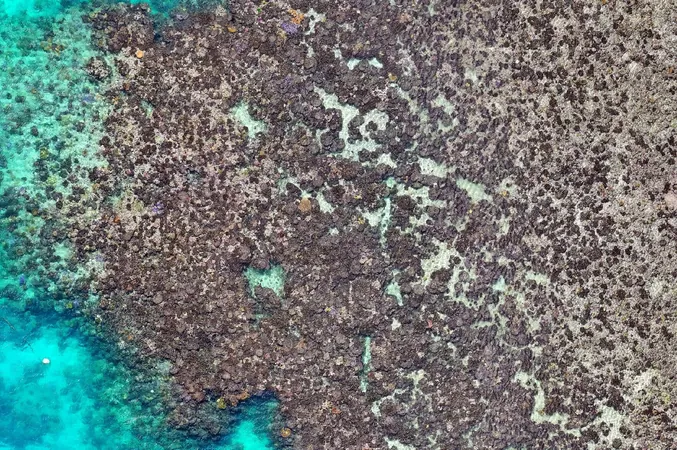
Groundbreaking Study Reveals Resiliency of Sea Sponge Amid Climate Change
2025-01-06
Author: Olivia
Introduction
A fascinating new study published in the Marine Ecology Progress Series explores the remarkable adaptability of a rare sea sponge in response to changing ocean conditions. This groundbreaking research is based on four years of footage captured by Ocean Networks Canada (ONC) seafloor cameras off the coast of British Columbia, marking the longest continuous observation of these ancient yet surprisingly dynamic creatures in their natural habitat.
Research Findings
The research, collaboratively conducted by scientists from the University of Victoria (UVic), ONC, and the University of Alberta, reveals significant changes in the sponge's physical condition. Following the marine heatwave, commonly referred to as "the Blob," which affected the Pacific Ocean between 2013 and 2016, scientists noted a shift in the sponge's color from a healthy pale orange-yellow to a deeper, darker shade accompanied by a lumpy texture.
Behavioral Adaptations
In addition to its color change, this extensive study sheds light on the sponge's intriguing behavior during the harsh winter months. The sponge, despite lacking muscles and a nervous system, contracted to half its size, entering a dormant state that suggests a complex response to environmental shifts. This finding spotlights a burgeoning area of research into the life cycles of sedentary marine animals like sponges, which are rarely monitored over extended periods.
Unique Contraction Behavior
One of the sponge's most intriguing behaviors observed was a unique "sneeze-like" contraction that lasted up to a day. This behavior serves as a means to clear debris accumulated during filter feeding, showcasing the sponge's active role in maintaining its health and surrounding ecosystem.
Implications for Marine Ecosystems
The sponge, affectionately nicknamed "Belinda" by the research team in homage to beloved cartoon character SpongeBob SquarePants, exemplifies the resilience found within marine ecosystems. Sea sponges can live for hundreds, if not thousands, of years, positioning them as vital indicators of oceanic health and change.
Ongoing Monitoring and Future Research
Ongoing monitoring of sea sponges like Belinda could provide deeper insights into how marine life adapts to fluctuating oceanic conditions, particularly those exacerbated by climate change.
Conclusion
To learn more about this unique sea sponge’s behaviors and the implications of this study, readers can explore the Marine Ecology Progress Series journal article titled "Long-term observations of a sponge in situ reveal a rich repertoire of contractile behaviors, including winter dormancy."









 Brasil (PT)
Brasil (PT)
 Canada (EN)
Canada (EN)
 Chile (ES)
Chile (ES)
 Česko (CS)
Česko (CS)
 대한민국 (KO)
대한민국 (KO)
 España (ES)
España (ES)
 France (FR)
France (FR)
 Hong Kong (EN)
Hong Kong (EN)
 Italia (IT)
Italia (IT)
 日本 (JA)
日本 (JA)
 Magyarország (HU)
Magyarország (HU)
 Norge (NO)
Norge (NO)
 Polska (PL)
Polska (PL)
 Schweiz (DE)
Schweiz (DE)
 Singapore (EN)
Singapore (EN)
 Sverige (SV)
Sverige (SV)
 Suomi (FI)
Suomi (FI)
 Türkiye (TR)
Türkiye (TR)
 الإمارات العربية المتحدة (AR)
الإمارات العربية المتحدة (AR)